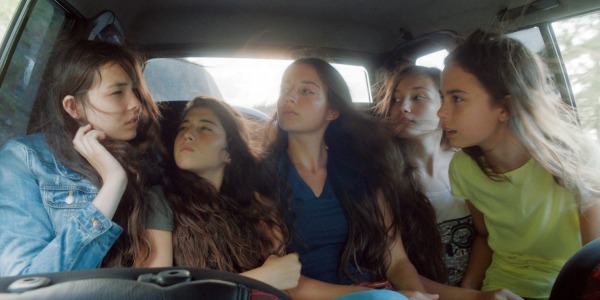MUSTANG: A One Of A Kind Coming-of-Age Story

Alistair is a 25 year old writer based in Cambridge.…
Every year, we get countless reports that there isn’t enough diversity in Hollywood storytelling. In the past couple of weeks alone, GLAAD’s annual media report has shown that LGBT diversity is only visible in TV, whilst Asian-American actors have begun a protest website called “Starring John Cho”, to highlight the lack of leading roles given to people of their ethnicity.
A story that needs to be told
There was a line in GLAAD’s celebration of diversity in independent cinema that rung alarmingly true, as they highlighted that diverse audiences shouldn’t have to look to the arthouses for films that relate to them. Mustang is the kind of film that an underrepresented social group in contemporary Hollywood could easily relate to – this is, to the best of my knowledge, the first coming-of-age story I’ve seen focusing entirely on teen and preteen girls.
Despite this, it exists at the fringes of pop-culture, where it will only be appreciated by the arthouse elite and ignored by the audience it would emotionally impact the most. Of course, Muslim audiences in the western world thankfully live in a less conservative society than the one presented here. But with many of the religious themes regarding a woman’s supposed “place”, it is hard not to imagine it being a universally relatable culture clash.

Mustang is the directorial debut of French-Turkish filmmaker Deniz Gamze Ergüven. Loosely autobiographical (mercifully, the more harrowing events depicted are purely fictional), the film tells the story of five orphaned sisters living in a quaint Turkish village. On the last day before their favourite teacher leaves, the girls play with male friends on the beach; getting on their shoulders for one game, they are instantly called out for their supposedly “inappropriate contact”. From here, the girls rebel against this conservative misreading of purely innocent fun – which leads them to be put under effective house arrest, not allowed to leave and being set up for marriage already, despite their young age.
This is a feminist’s nightmare – they are told what to wear, whilst all school lessons are replaced by being taught how to cook and clean. Mustang isn’t a period piece, but you’d be forgiven for thinking otherwise. A less assured filmmaker would accidentally turn this into a hand-wringing piece criticising the ethics of an entire religion. On just her debut feature, Ergüven manages to make it nuanced; it is the conservative, shut-off nature of the family causing this to happen, not the overall ethical practices in a densely populated Muslim nation.
If anything, the film is occasionally problematic in how it draws the family elders as villains, simplifying a tale which should revel in the moral complexities that naturally arise when different people view the same religion differently. Only one of the family elders is a true villain – and that is the character portrayed with a remarkable amount of restraint, despite the grotesque qualities.
An epic story with a lean running time
This is a minor narrative problem that is likely due to the brief length. At only 97 minutes, it is hard to escape the feeling that with the plethora of major characters and thematically rich material, this would be better suited as an epic miniseries. As the reports above suggest, diverse stories are more likely to be found on TV, which at least clarifies why it was essential it needed to be made as a movie. But with an epic, overarching story about familial conflict, it does feel like it needs a broader canvas – especially with characters as rich as these ones, who could easily develop far more strongly were the narrative surrounding them not unfolding over an unrealistically quick time frame.

This is why it makes sense for the elders to appear more conniving and conservative, as it ensures the story develops with a snowball effect and repercussions are instantly felt. A climactic sequence, involving a reverse-home invasion, feels a direct result of the fast pacing – the rate at which character motivations take a turn for the worse ensures a lack of restraint is inevitable. What makes Mustang special is that it never becomes a melodrama, despite this.
The film is also a remarkably evenhanded portrayal of female sexual desire during pubescent stages, allowing its characters to be treated with respect even as they make plenty of mistakes. It is reminiscent of another recent directorial debut, Marielle Heller’s The Diary of a Teenage Girl, one of the best (and most criminally underrated) films of last year, due to exploring a girl making bad life decisions without ever chastising her for it. Mustang is never as successful due to constantly chastising the elder characters who are chastising the young; Diary of a Teenage Girl had a remarkable evenhandedness when it came to empathising with each member of the morally bankrupt ensemble that surrounded the main character. Here, empathy doesn’t stretch beyond the main characters.
Mustang is far too emotionally involving to be considered a sensationalisation of the surrounding conservative Muslim views, but it does frequently flirt with merely being condescending towards them. You are left wondering why the women are content with merely being housewives, marrying off children to strangers – the sole flaw is failing to humanise these character decisions, relying merely on religious context as support for them, instead of seeing how it is personally affecting the characters.
Conclusion
But above all, Mustang is an utterly arresting coming-of-age story – and most importantly, one that vitally needs to be told. The end result is one of the better debut features of recent years, that left me in no doubt that Deniz Gamze Ergüven is a filmmaker with a conflicting social-realist eye and a humanist heart. Both could work well together, but Mustang isn’t the seamless blend of personal and socio-political that it needs to be. Yet, it is still captivating from beginning to end and will leave every viewer crying out to discover more stories like this.
Which directors had the best debut films in recent years?
Mustang is out on DVD/Blu-Ray in the US now and is currently in limited cinema release in the UK. All international release dates are here.
Does content like this matter to you?
Become a Member and support film journalism. Unlock access to all of Film Inquiry`s great articles. Join a community of like-minded readers who are passionate about cinema - get access to our private members Network, give back to independent filmmakers, and more.
Alistair is a 25 year old writer based in Cambridge. He has been writing about film since the start of 2014, and in addition to Film Inquiry, regularly contributes to Gay Essential and The Digital Fix, with additional bylines in Film Stories, the BFI and Vague Visages. Because of his work for Film Inquiry, he is a recognised member of GALECA, the Gay & Lesbian Entertainment Critics' Association.












